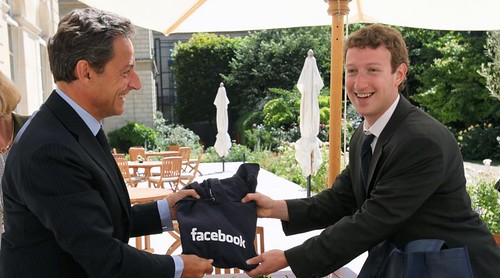France Ex-President Sarkozy ongoing trials in 2023

Mark Zuckerberg elysee france Nicolas Sarkozy e-G8
Many ponder the phenomenon of individuals, like Nicolas Sarkozy, who remain in the public eye despite legal entanglements. This growing trend raises questions about how such exposure impacts perceptions and elevates those figures often despite their legal troubles. Let’s just remember what is done to be sentenced to three years in prison, with one year to be served under house arrest with an electronic monitoring bracelet.
Azibert-Bismuth Case
The Paris Court of Appeal, in a decision rendered on Wednesday, May 17, confirmed the conviction of the former President of the Republic, Nicolas Sarkozy, to a three-year prison sentence, with one year to be served, on charges of corruption and influence peddling. Additionally, the Court of Appeal imposed a three-year suspension of civil rights, rendering him ineligible. Mr. Sarkozy had received a similar sentence in 2021. Following the announcement of this verdict, Mr. Sarkozy’s legal representatives expressed their intention to appeal to the Court of Cassation.
The charges against Mr. Sarkozy stem from his alleged attempt to obtain confidential information from Gilbert Azibert, a magistrate at the Court of Cassation, pertaining to a separate legal case concerning him, the Bettencourt case. In exchange for this information, Nicolas Sarkozy is alleged to have promised to use his influence to secure a prestigious position for Mr. Azibert in Monaco. The prosecution’s case relies heavily on telephone wiretap evidence, capturing conversations between Nicolas Sarkozy and his legal counsel, Thierry Herzog, conducted on an unofficial communication line involving two prepaid phones registered under the pseudonym ‘Paul Bismuth.'”
2012 Presidential Campaign Funding Case (Bygmalion)
On September 30, 2021, Nicolas Sarkozy received a one-year prison sentence, without parole, for “illegal campaign financing,” as handed down by the Paris Criminal Court. This legal action arose from suspicions surrounding the financing of his 2012 presidential campaign. During the trial, which took place from May 20 to June 22, 2021, Mr. Sarkozy appeared in court for only one day of the hearings. Alongside Mr. Sarkozy, all thirteen other defendants were found guilty of “complicity in illegal campaign financing.”
Bastien Millot, co-chairman of the Bygmalion group and an associate of Jean-François Copé, received a three-year prison sentence, with 18 months suspended, and a fine of €100,000. Franck Attal, Sébastien Borivent, and Guy Alvès, former executives of Bygmalion and its subsidiary Event & Cie, were also prosecuted and received two-year prison sentences, with part of the sentence suspended, along with a €100,000 fine. The investigation and trial unveiled a system involving fraudulent invoices and fictitious agreements, connecting the Union for a Popular Movement (UMP) with the communications agency Bygmalion. The latter was responsible for organizing numerous campaign events during Mr. Sarkozy’s rapid 2012 presidential campaign, intended to obscure the substantial breach of the legally authorized campaign expenditure limit. Crucially, Mr. Sarkozy was alerted to the risk of exceeding the authorized limit as early as March 7, 2012, but chose to disregard the warning, instead opting to increase the frequency of campaign events. In the prosecution’s words, “By intensifying his campaign, Nicolas Sarkozy failed to uphold the fundamental principle of equality among candidates and must now face the consequences, alongside those who acted on his behalf.”
Suspected Libyan Financing in 2007
Nicolas Sarkozy faces allegations of having financed a portion of his 2007 presidential campaign using funds allegedly sourced from the regime of the former Libyan dictator, Muammar Gaddafi. Following an exhaustive ten-year investigation, two financial magistrates have referred Mr. Sarkozy to the criminal court, where he will face charges of “complicity in the misappropriation of public funds,” “passive corruption,” “illegal campaign financing,” and “conspiracy to commit an offense punishable by ten years of imprisonment.”
The trial is scheduled to take place “between January 6, 2025, and April 10, 2025,” before the 32nd chamber of the Paris Criminal Court, as per the directive of the National Financial Prosecutor’s Office (PNF). This referral also implicates twelve other individuals, including three former ministers closely associated with Nicolas Sarkozy: Claude Guéant, Brice Hortefeux, and Eric Woerth, the former treasurer of the controversial presidential campaign. Additionally, two businessmen, Franco-Lebanese Ziad Takieddine, currently residing in Lebanon, and Franco-Algerian Alexandre Djouhri, suspected of acting as intermediaries, are implicated in the case. Nicolas Sarkozy has consistently denied receiving any financial contributions, either directly or indirectly, in cash or via wire transfers, from Libyan sources for his campaign. In May 2023, the National Financial Prosecutor’s Office requested Mr. Sarkozy’s referral to the criminal court, arguing that “while it appears evident that the entirety of the Libyan funds initially earmarked for the campaign was not utilized for that purpose, opaque financial channels facilitated the eventual disbursement of cash, within a timeline and sequence compatible with clandestine utilization.”
Russian Case (Reso-Garantia)
Questions have arisen within the realm of justice concerning a €500,000 payment received by Nicolas Sarkozy in early 2020, in connection with a consulting contract with the Russian insurance group Reso-Garantia. As initially reported by Mediapart at the outset of 2021, “the justice system is seeking to determine whether the former head of state solely acted as a consultant, which would be entirely legal, or if he engaged in potentially illicit lobbying activities on behalf of Russian oligarchs.”
A preliminary investigation for “influence peddling” was launched against Nicolas Sarkozy by the National Financial Prosecutor’s Office (PNF) in the summer of 2020, and it remains ongoing.
Worst thing here, is that the ex-president says all of that is a conspiracy and that french justice is not so reliable. Can you imagine ?
You can read more there : https://www.francetvinfo.fr/societe/affaire/les-affaires-sarkozy or here




